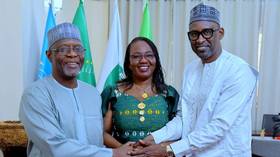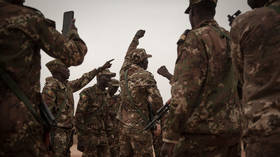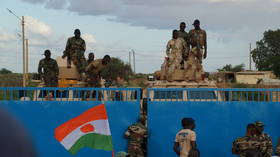Three African states move to launch federation

The foreign ministers of Burkina Faso, Mali, and Niger have endorsed plans to create a federation uniting the three West African nations, all currently ruled by their respective militaries, with the goal of tackling common challenges.
The decision was announced in a joint statement published on X (formerly Twitter) on Sunday, following a two-day meeting in Mali's capital, Bamako, which focused on plans to develop the new Alliance of Sahel States (AES).
The military rulers of the three former French colonies signed the AES charter in September, agreeing to help each other in the event of external aggression or internal threats to their sovereignty. The states were previously members of the Paris-backed G5 Sahel agreement, along with Chad and Mauritania. The G5 accord has since fallen apart, following a series of military coups in the region.
The foreign ministers of the three Sahel nations held their first meeting from Thursday to Friday and agreed on “appropriate measures,” including protocols to implement the AES pact.
“The Ministers recommended encouraging the participation of elected representatives, women, young people and civil society in AES initiatives,” according to the joint statement.
They further stressed the importance of diplomacy and defense in expanding their political and economic integration.
Previously, the countries' finance ministers proposed setting up a stabilization fund and investment bank for the AES, as well as a “committee tasked with furthering discussions on economic and monetary union issues.”
Malian Foreign Minister Abdoulaye Diop, who hosted his Burkinabe counterpart Olivia Rouamba and Niger's Bakary Yaou Sangare, said the recommendations will be submitted to the military rulers, who are scheduled to meet in Bamako at an unspecified date.
Last month, Nigerien coup leader General Abdourahamane Tchiani traveled to Mali and Burkina Faso, his first trips abroad since the July ouster of Niger's President Mohammed Bazoum. General Tchiani thanked his counterparts in Bamako and Ouagadougou for the assistance they provided to Niamey, which he said enabled Niger to withstand threats from the West African regional bloc ECOWAS. The 15-state alliance has threatened to deploy military forces against Niamey’s new authorities and has frozen the country’s accounts in regional central banks in response to the Bazoum’s overthrow.
During his visit, the Nigerien new ruler commended the creation of the AES, which he claimed would transform the Sahel region, plagued by jihadi groups, from a “zone of insecurity” to a “zone of prosperity.”
Mali and Burkina Faso have expressed solidarity with Niger’s coup leadership, warning against military interventions in Niamey aimed at restoring pro-Western President Bazoum.
The three West African states have severed military ties with France, whose troops were previously involved in fighting insurgencies linked to Al-Qaeda and Islamic State.
Meanwhile, a Russian delegation led by Deputy Defense Minister Colonel General Yunus-Bek Yevkurov met with Mali's interim President Assimi Goita over the weekend, with talks centered on energy and transport cooperation. The meeting in Bamako on Saturday was said to be part of Moscow's efforts to strengthen ties with the AES member states.
Mali's Finance Minister Alousseni Sanou said the launch of an airline that would operate routes between Mali, Burkina Faso, and Niger was also discussed during the meeting with Russian officials.














